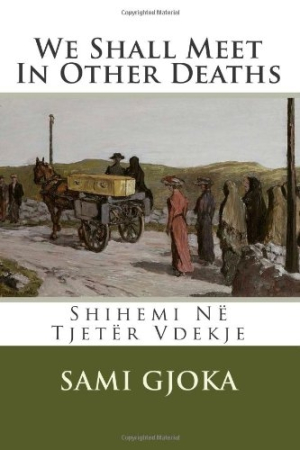We Shall Meet in Other Deaths
Shihemi Në Tjetër Vdekje
Gjoka’s poems flow naturally from theme to theme, candidly narrating human desires and fears.
In a volume of poetry that runs the gamut from beautiful and candid to vulgar and hyperbolic, Sami Gjoka exposes human nature in all its savage and heartbreaking permutations. With a modern approach and intensity, We Shall Meet in Other Deaths uses patriotism, mysticism, and complex relationships to tell Gjoka’s unique story as an Albanian American living and experiencing middle age in America. Drawing from insightful observation and speculation, Gjoka defines, mourns, and celebrates mortality with poems designed to connect with, and provoke, his readers.
Many of Gjoka’s pieces are brilliantly drawn from experience with brutal honesty and nuance, and he is a man’s poet. While he uses women in his poems, often to illustrate the injustice of society or the callousness of men, he makes no apologies about the fact that the women are written as faceless representations. In his poem “Glad I Do Not Have a Daughter,” he tells his make-believe daughter that she comes “for the balls of men, who think that you should be pleased / If they spread you and they spray you / With semen.” He is coarse and generalizes both men and women into their most narrow and primitive selves. And yet, exaggerated as they may be, Gjoka uses pieces like these to grieve the faults of mankind and remind readers that these poems are a truth for many.
We Shall Meet in Other Deaths is not formatted with chapter breaks or sections, but the organization of the poems nevertheless feels deliberate and follows an organic thread through several themes. Gjoka begins by observing and mourning death as an outsider, questioning the significance of human life with cynicism and hidden pain. From there, his poems explore sexuality, the predatory instincts of man, and whether God created man in his image.
Gjoka takes on nationality and the tension of honor and disgrace in the long history of human civilization. In one of his longer poems, “Trust Those Down to the Ground,” Gjoka covers centuries of religious and political unrest with thick footnotes and a masterful tone of uncertainty. But when he eventually ends with “don’t you let little people who reach the peaks of Olympus / Tell you that they are the only legitimate sons of Gods, / For the lighter, higher things will float and will rise,” he eloquently disarms an entire history. In the end, he returns to death, writing several pieces in the first person to describe dying. There is a handful of less successful poems about why he is a poet, but Gjoka comes back to where he started, this time more personally connected with death.
There are scattered misspellings in the English poems, but having the Albanian and English text side by side is a wonderful, constant reminder of the author’s experience and perspective. Gjoka’s voice is authentic and well suited to his poems, which are blindingly real and thought provoking.
Reviewed by
Sara Budzik
Disclosure: This article is not an endorsement, but a review. The publisher of this book provided free copies of the book and paid a small fee to have their book reviewed by a professional reviewer. Foreword Reviews and Clarion Reviews make no guarantee that the publisher will receive a positive review. Foreword Magazine, Inc. is disclosing this in accordance with the Federal Trade Commission’s 16 CFR, Part 255.

